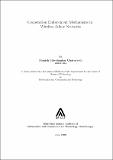Cooperation enforcement mechanisms in wireless adhoc networks
Abstract
Wireless adhoc networks are autonomous, infrastrutureless networks where there are no dedicated routers or base stations and nodes are expected to cooperate in Wireless performing routing duties to keep network connected. Cooperation can be assumed if all nodes belong to single authority (e.g. military service or disaster management). But in applications where nodes do not belong to single authority and have limited resources (energy of battery driven devices), like pervasive computing or ubiquitous computing environment, one can not deny possibility of node selfishness. Also as there is no central authority to control node behavior, one can not deny possibility of node maliciousness.
Many cooperation enforcement schemes are proposed in literature, and every scheme is shown to perform better under its own set of assumptions. These assumptions are different for different schemes. So, we aim at defining common set of assumptions and comparing selected schemes on this common ground with respect to packet delivery ratio, energy consumption, routing and other control overhead. We find that with the traffic scenario where nodes do not need services of one another at the same time, the cooperation schemes are not effective in dealing with node selfish ness. We also find that, while dealing with malicious nodes, all cooperation schemes perform better than Dynamic Source Routing(DSR) protocol in improving packet de- livery ratio(PDR), but this improvement comes at the cost of significant increase in routing control packets overhead and energy consumption of cooperation enforcement schemes is higher than that of DSR. Also they fail in punishing misbehaving nodes and the PDR of malicious nodes is comparable to that of good nodes.
Collections
- M Tech Dissertations [923]
Related items
Showing items related by title, author, creator and subject.
-
Queueing-theoretic framework for perfermance analysis of mobile ad hoc networks with finite buffer nodes
Shah, Sapan (Dhirubhai Ambani Institute of Information and Communication Technology, 2008)Wireless Ad Hoc network is a decentralized wireless network which allows nodes to join and create networks without any infrastructure. These kinds of networks are advantageous because they can be readily deployed anywhere, ... -
Wireless sensor network based automatic meter reading: WSNAMR
Sutariya, Mahesh R. (Dhirubhai Ambani Institute of Information and Communication Technology, 2009)Automatic Meter Reading is technology evolved from 1995[3] or before, for remote collection of utilities measurement data which involve Electricity, Gas and Water etc. In this process of evolution every time new idea was ... -
Comparative study between exponential back off and dynamic waiting strategies for medium access in wireless ad hoc networks
Shah, Rahul (Dhirubhai Ambani Institute of Information and Communication Technology, 2009)IEEE 802.11 DCF (IEEE 802.11 Distributed Coordination Function) is widely used MAC protocol for wireless channel access. Although it is developed for single hop networks where all nodes are in the same radio range, it can ...

